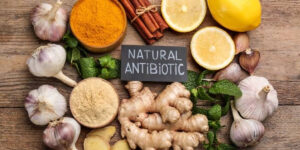Natural antibiotics possess significant healing capabilities, serving as a valuable substitute or addition to artificial medications.
These remedies have played a pivotal role in modern healthcare by delivering effective solutions for bacterial infections.
Despite the benefits of synthetic antibiotics, excessive dependence on them has resulted in challenges such as antibiotic resistance and adverse reactions.

The natural antibiotics you need to eradicate infections
Nature, with its extensive array of medicinal plants and compounds, provides proven alternatives that have been utilized for generations.
These natural antibiotics can help combat infections while promoting overall health and well-being.
Here are some remarkable natural antibiotics you can consider for fighting infections:
1. Garlic: The potent antimicrobial
Garlic, known scientifically as Allium sativum, has a long history of medicinal use spanning thousands of years. It is rich in allicin, a potent compound with robust antimicrobial and anti-inflammatory characteristics. This herb is effective in fighting off various pathogens like bacteria, viruses, and fungi.
How to use:
– Raw consumption: Crush or chop garlic cloves and let them sit for a few minutes before consuming to activate allicin.
– Garlic oil: Use garlic-infused oil for topical applications or as a supplement.
2. Honey: Nature’s sweet healer
Honey is renowned for its antibacterial and healing properties. It contains hydrogen peroxide, methylglyoxal, and other compounds that give it potent antimicrobial effects. Honey can help treat wounds, burns, and internal infections.
How to use:
– Topical application: Apply honey directly to wounds or infected areas.
– Oral consumption: Take a spoonful of raw honey daily to boost immunity and fight infections.
3. Oregano oil: The strong antiseptic
Oregano oil, scientifically known as Origanum vulgare, stands out as one of the most powerful natural antibiotics. It is packed with carvacrol and thymol, compounds known for their robust antibacterial, antiviral, and antifungal properties. This essential oil is especially effective in combating respiratory and digestive infections.
How to use:
– Diluted oil: Dilute oregano oil with carrier oil and apply topically.
– Oral supplements: Take oregano oil capsules or diluted drops.
4. Ginger: The anti-inflammatory agent
Ginger (Zingiber officinale) is well-known for its anti-inflammatory and antimicrobial properties. It can help treat bacterial and viral infections, particularly in the respiratory and digestive systems.
How to use:
– Tea: Brew ginger tea from fresh or dried ginger root.
– Raw ginger: Add raw ginger to meals or smoothies.
5. Turmeric: The golden antibiotic
Turmeric (Curcuma longa) contains curcumin, a compound with powerful anti-inflammatory, antioxidant, and antimicrobial effects. Turmeric is effective against a range of bacteria and viruses, and it also supports overall immune health.
How to use:
– Golden milk: Make a soothing drink with turmeric, milk, and honey.
– Turmeric supplements: Take curcumin supplements for concentrated benefits.
The therapeutic potential of natural antibiotics presents a valuable substitute or addition to artificial medications. Garlic, honey, echinacea, goldenseal, oregano oil, ginger, and turmeric offer distinct and powerful antimicrobial characteristics that aid in combatting infections and promoting general well-being.
When using natural antibiotics, it’s crucial to employ them judiciously and seek guidance from a healthcare provider, particularly for severe infections or when concurrently taking other medications.

